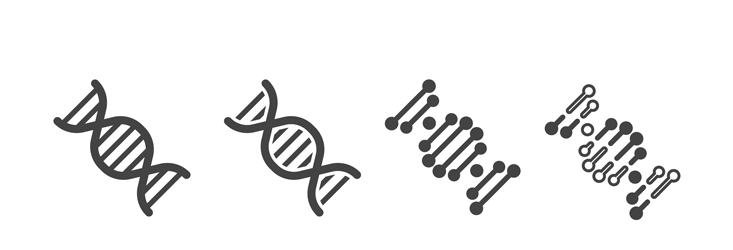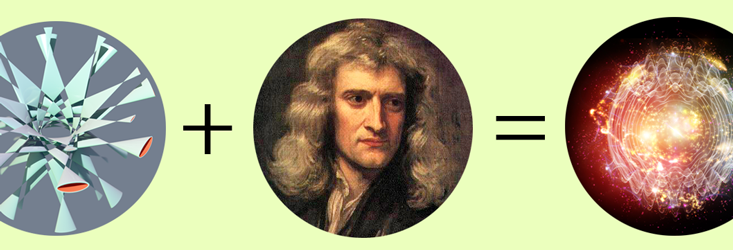What Impossible Meant to Feynman

When you are a young physics professor at Caltech, giving a lecture about a new type of matter you have discovered, and your idol, Richard Feynman, sitting in the front row, belts out, after your talk, “Impossible!” you are going to be rattled. And Paul J. Steinhardt was. But Steinhardt, today the Albert Einstein Professor in Science at Princeton University, knew Feynman meant something other than Steinhardt’s theory was wrong or contrary to natural laws. Just what Feynman meant is the subject of Steinhardt’s captivating remembrance of the Nobel laureate physicist. When, as a student, he read Feynman’s Lectures, Steinhardt writes, “I felt like my skull had been pried open and my brain rewired.” Steinhardt’s article delves into the predictable bounces of Super Balls, the orderly atomic arrangement of quasicrystals, and most of all the brilliance of the physicist with the “disarming, devilish smile.”
It’s the End of the Gene As We Know It

Not long ago nearly every biology article or book described genes as a blueprint for development. Genes constituted a one-way flow of information—gene to protein to characteristic—that was “tantamount to writing the whole ‘book’ of a complex being,” writes Ken Richardson in one of our most provocative and widely admired articles of 2019. Drawing on a wealth of recent studies, Richardson upends the “central dogma” that defined genetics for decades: “Scientists now understand that the information in the DNA code can only serve as a template for a protein. It cannot possibly serve as instructions for the more complex task of putting the proteins together into a fully functioning being, no more than the characters on a typewriter can produce a story.” As Richardson explains why the blueprint model is outdated, his article gains dimension. The outdated model, he writes, has been used to justify questionable theories about medical cures as well as race and intelligence. Revisions of the gene concept, Richardson concludes, “need to reach the general public soon—before past social policy mistakes are repeated.”
Never Underestimate the Intelligence of Trees

Strangely enough, and it’s never clear how these things blossom in popular culture, 2019 was the year of the tree. This past year Richard Powers won the Pulitzer Prize in Fiction for his novel, The Overstory (first excerpted in Nautilus), about the innate connection between trees and humans; Robert MacFarlane ventured into worlds beneath our feet, including the “wood wide web” of tree networks, in his acclaimed book, Underland (also excerpted in Nautilus.) Both Powers and MacFarlane drew on the work of Suzanne Simard, a professor in the Department of Forest and Conservation at the University of British Columbia, whose tree smarts are on full display in her Nautilus interview with Brandon Keim. If intelligence is defined by communication, by past experiences guiding wiser behaviors, Simard says, “Plants do have intelligence. They have all the structures. They have all the functions.” And they behave in some remarkable ways. In one of the interview’s many fascinating passages, Simard explains, “A parent tree will even kill off its own offspring if they’re not in a good place to grow.”
The Math That Takes Newton Into the Quantum World

One of our favorite things to do as Nautilus editors is give scientists space to roam as writers, encourage them to tell personal stories about their careers, their passions and challenges, that fall outside the margins of academic journals. One of our favorite examples is math professor John Baez’s confession about never caring for what many of his colleagues consider a “majestic subject” in math, “algebraic geometry.” You might think an article about algebraic geometry is a hall pass to leave Nautilus immediately. But Baez weaves a spell over readers that holds them in his clutches. He admits when he was young, he found arithmetic like long division insufferably boring. “But later, when I realized that by fiddling around with equations I could learn about the universe, I was hooked. The mysterious symbols seemed like magic spells. And in a way, they are. Science is the magic that actually works.” Baez fell in love algebraic geometry by discovering its links to quantum physics. He beautifully explains the connection and its revelations about universal structures. Baez’s story is also about something else we love at Nautilus, and that’s faith that a subject that appears complex can, through clear prose and a good story, be understood.

If you worry what Google and Facebook know about you, what your cell phone is telling them every minute about where you are and what you are doing, then perhaps you’d better not move to China, or if you do, you might want to embrace the bohemian habits of a Luddite. That’s because the social media “ecosystem” WeChat, on which 1 billion Chinese citizens conduct daily business, from ordering coffee to paying utility bills to booking doctor appointments, makes its American counterparts seem like data-gathering slackers. That’s what Barclay Bram learned when he moved to China to work on his Ph.D. in anthropology at the University of Oxford’s School of Global and Area Studies. Bram documents his every move on WeChat, showing readers just how deep into private lives that the undeniably handy app reaches. It’s a fascinating and astonishing story. Who’s to blame? “Today we are our own informants,” Bram writes. “We have written our own digital files and diligently update them with the most frighteningly detailed accounts ever collated in human history. We have created an infinite anthology, but of what?”


























